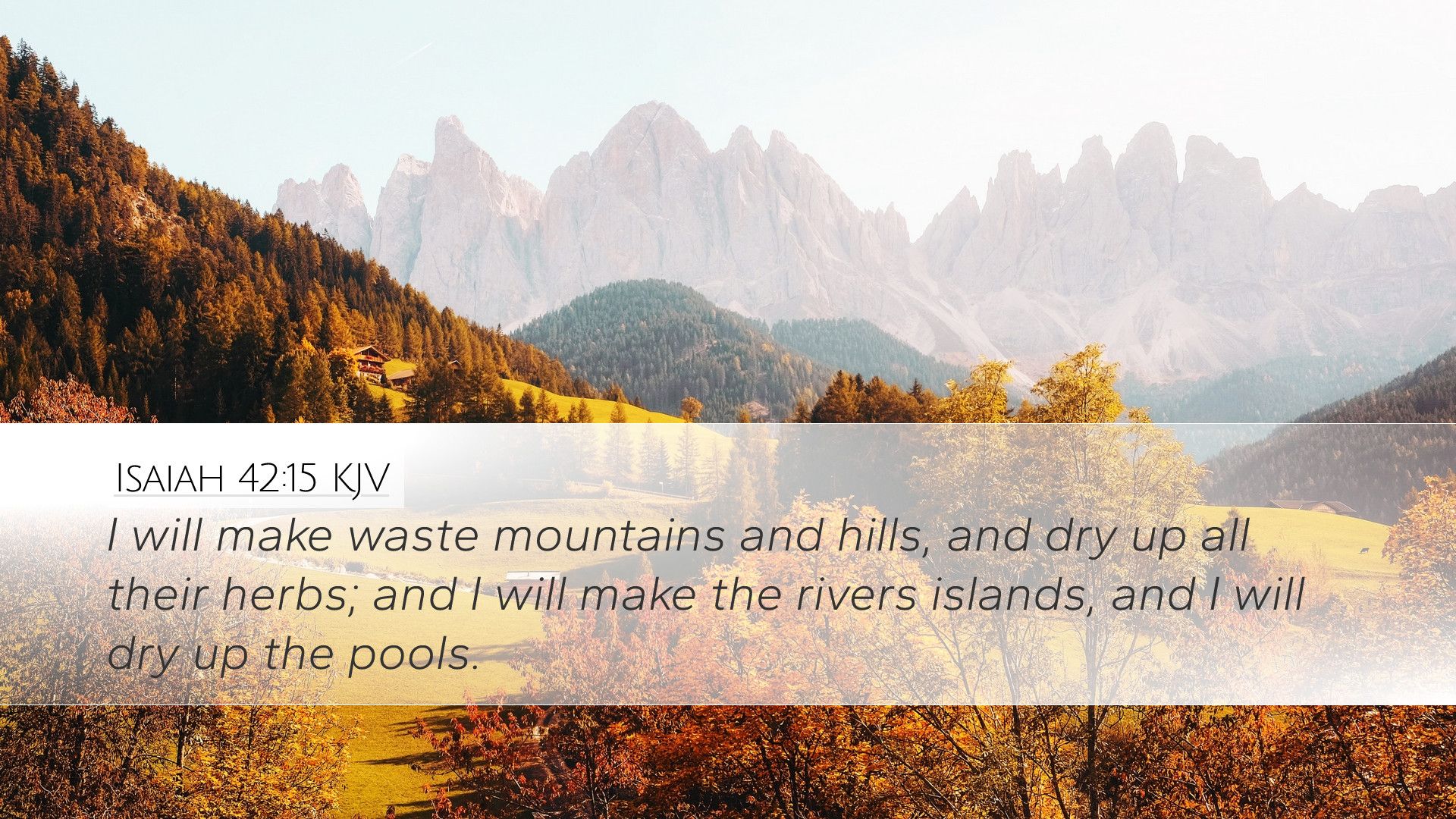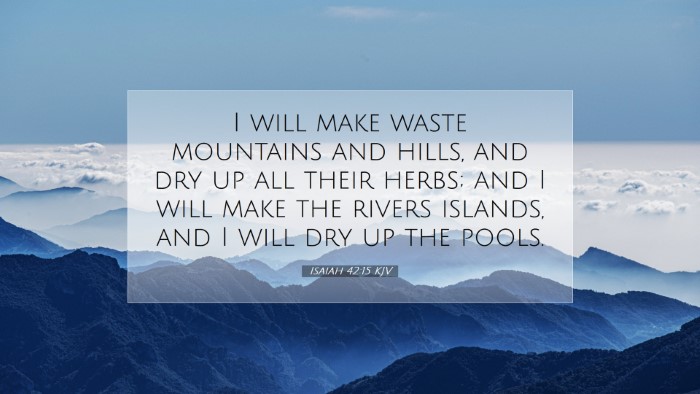Commentary on Isaiah 42:15
Verse Reference: Isaiah 42:15 - "I will make waste mountains and hills, and dry up all their herbs; and I will make the rivers islands, and I will dry up the pools."
Contextual Overview
The book of Isaiah is a profound theological text which serves to address the sins of Israel and the dire need for redemption. Isaiah 42 is part of the larger tapestry of prophecy concerning the Servant of the Lord, capturing the dual themes of judgment and hope. The prophetic vision often juxtaposes God's justice against His mercy, illustrating His commitment to restoring creation.
Commentarial Insights
Matthew Henry's Commentary
Destruction of Idolatry: Henry articulates that God’s declaration of making waste mountains and drying herbs metaphorically indicates the dismantling of idols and the emptiness of idol worship. The mountains symbolize the lofty and proud structures of human rebellion against God, which He would level.
Purging of the Unrighteous: He emphasizes that this judgment is also a purification process, suggesting that God, as a just judge, removes obstructions that stand against righteousness. The reference to drying up pools signifies the removal of comforts and support systems that enable sinfulness.
Albert Barnes' Notes
Divine Sovereignty: Barnes highlights the sovereignty of God in this verse, noting that the actions described directly assert His authority over nature itself. "I will make waste..." resonates with the declaration that God not only has power over the spiritual realm but also over the physical world.
Symbolism: The 'mountains' and 'hills' represent nations or kingdoms, and God's intention to make them waste signifies divine judgment on those that stand opposed to His will. Barnes also points to the contrast between aridity (drying up) and fertility which reflects the spiritual barrenness of those nations.
Adam Clarke's Commentary
Future Restoration: Clarke brings a note of hope, suggesting that while this passage speaks of destruction, it also points to a future restoration. He asserts that these acts of making waste are preparatory for the new order of things that God intends to establish. Thus, the desolation precedes the reconstruction of true worship.
Cosmic Judgment: Clarke interprets the imagery as not simply local, but cosmic, where the natural world responds to God's judgment against humanity. This aligns with various prophetic texts that depict nature in turmoil during times of divine intervention.
Theological Reflections
This verse presents a critical understanding of God’s character as sovereign, just, and redemptive. His judgment is not arbitrary but serves a purging purpose, aiming to realign creation with His divine order. The metaphorical language presents a stark visual of divine disruption, intended to elicit reflection on human reliance upon worldly structures rather than upon God.
Moreover, this verse encapsulates the prophetic hope found throughout Isaiah; the same God who judges is also the one who restores. The imagery we encounter in Isaiah 42:15 beckons an understanding that through upheaval, God seeks to establish righteousness.
Practical Applications
- Pastoral Implications: Pastors may draw insights from this commentary to preach on the themes of divine judgment and restoration, helping congregants understand the necessity of repentance and the hope found in God's sovereignty.
- Student Engagement: For students of theology, this verse challenges critical examination of God’s attributes— how do justice and mercy coexist in the character of God? Engaging with the commentaries allows an exploration of the dynamics within divine-human relationships.
- Scholarly Reflection: Theological scholars might explore the historical contexts influencing Isaiah’s prophecy, examining the socio-political conditions of Israel and the surrounding nations and understanding this verse as both a historical and future eschatological promise.
Conclusion
Isaiah 42:15 stands as a powerful reminder of God's control over both creation and history. This verse serves to challenge readers to contemplate the gravity of rebellion against God while also reaffirming the profound hope of redemption and restoration that is intricately woven into His divine economy. As pastors, theologians, and students engage with this passage, they are invited into a deeper understanding of the nature of God, and the transformative power of His word in a broken world.


